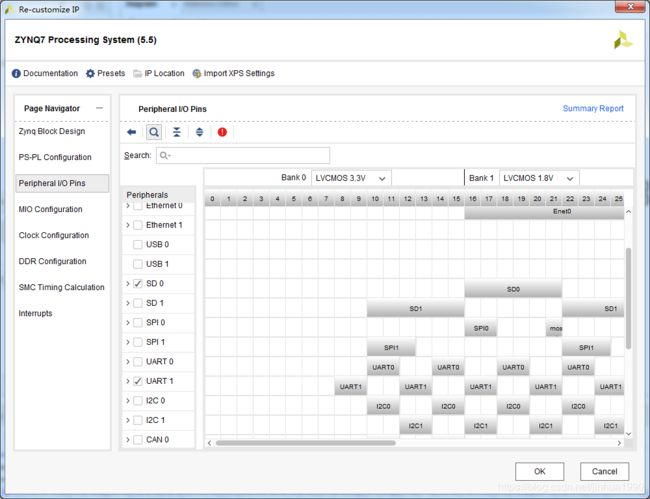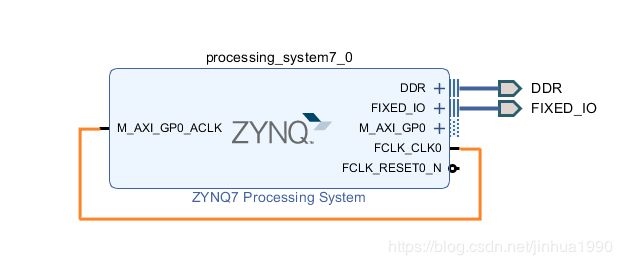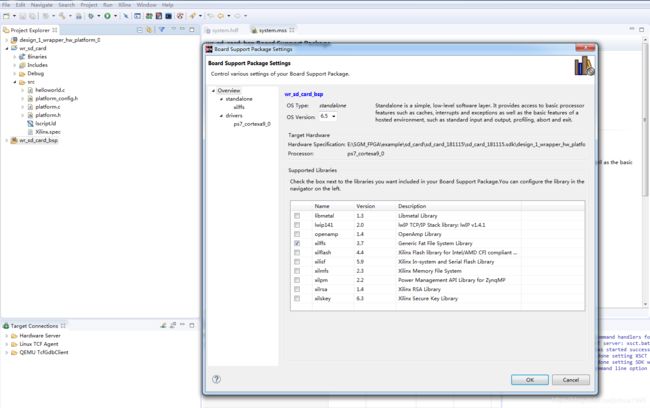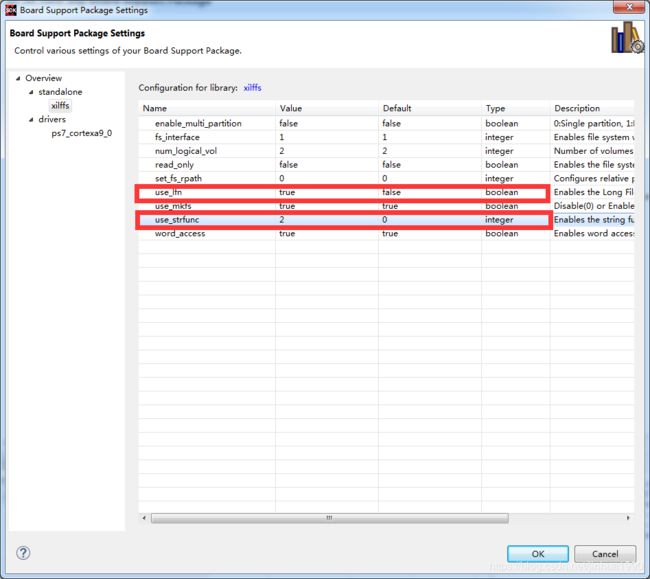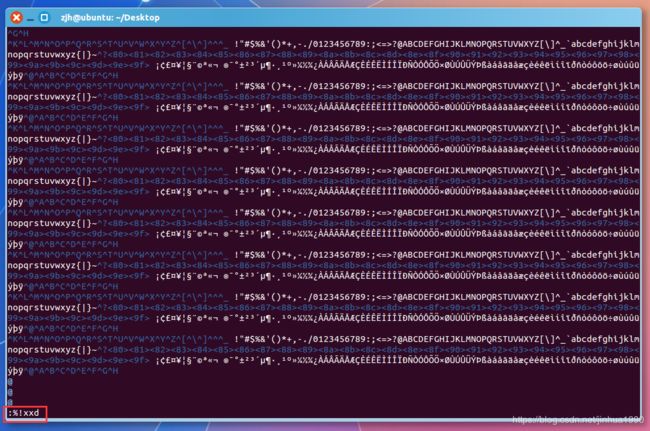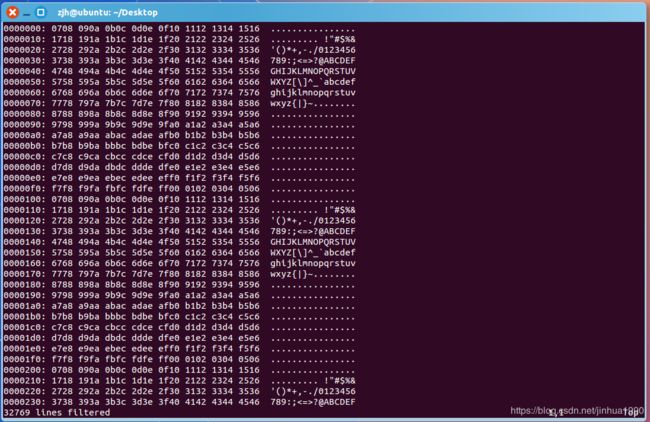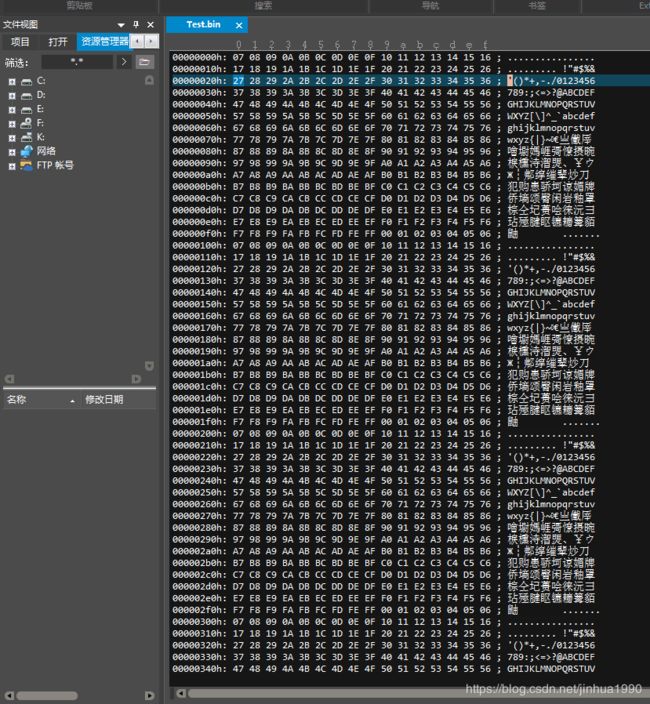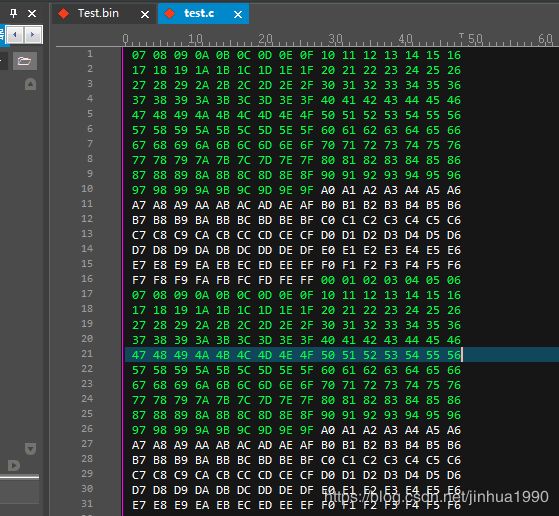Zynq读写SD卡
之前一直没有写过博客,也不知道如何开始,现在想记录一下自己做过的事情,以后回看还能记得更快。那就以此为开始吧~~~
项目需要,要实现一个将数据写入到SD卡中的小demo,查找了一些资料,最后终于实现,将具体实现方案记录如下。
1.搭建Zynq硬件平台,根据开发板及自己需要设置好DDR、PL时钟、外设等,本实验要选中SD0、UART1;
2.搭建好硬件平台如下所示,生成bit文件并导出到SDK中。
3.创建Appliaction Project,选择Helloworld就行。读写SD卡用到了xilffs库,所以需要在bsp中添加xilffs库,同时选中xilffs库做如下修改配置。
在配置上,主要参考了这位博主:https://blog.csdn.net/pro_he/article/details/79937426#zedboard四嵌入式应用程序开发实例三写入数据到sd卡txt文件中。
4.先测试官方提供例程,找到Xilinx Vivado安装目录下的xilffs提供代码,按照版本选择,我的是3.7,D:\Xilinx\SDK\2017.4\data\embeddedsw\lib\sw_services\xilffs_v3_7\examples,将example内容拷贝到helloworld.c中。
这里面主要就是实现了向SD卡中写数据,再读出写入的数据,最后做判断比较两者数据,比较简单。但代码提供的是生成了一个Test.bin文件,在Ubuntu下使用vim查看如下。
将其用:%!xxd转换后,可看出具体数据,写入是没有问题的。
5.如何将数据提取出来去使用呢?我用的是UltraEdit,打开如下
选中所有数据,右键 ——> 十六进制复制选定视图(V),粘贴到Test.c文件中,然后删除掉不需要的列就可以了。
6.读写SD卡的代码如下:
/***************************** Include Files *********************************/
#include
#include "platform.h"
#include "xparameters.h" /* SDK generated parameters */
#include "xsdps.h" /* SD device driver */
#include "xil_printf.h"
#include "ff.h"
#include "xil_cache.h"
#include "xplatform_info.h"
/************************** Constant Definitions *****************************/
/**************************** Type Definitions *******************************/
/***************** Macros (Inline Functions) Definitions *********************/
/************************** Function Prototypes ******************************/
int FfsSdPolledExample(void);
/************************** Variable Definitions *****************************/
static FIL fil; /* File object */
static FATFS fatfs;
/*
* To test logical drive 0, FileName should be "0:/" or
* "". For logical drive 1, FileName should be "1:/"
*/
static char FileName[32] = "Test.bin";
static char *SD_File;
u32 Platform;
#ifdef __ICCARM__
#pragma data_alignment = 32
u8 DestinationAddress[10*1024*1024];
u8 SourceAddress[10*1024*1024];
#pragma data_alignment = 4
#else
u8 DestinationAddress[10*1024*1024] __attribute__ ((aligned(32)));
u8 SourceAddress[10*1024*1024] __attribute__ ((aligned(32)));
#endif
#define TEST 7
/*****************************************************************************/
/**
*
* Main function to call the SD example.
*
* @param None
*
* @return XST_SUCCESS if successful, otherwise XST_FAILURE.
*
* @note None
*
******************************************************************************/
int main(void)
{
int Status;
xil_printf("SD Polled File System Example Test \r\n");
Status = FfsSdPolledExample();
if (Status != XST_SUCCESS) {
xil_printf("SD Polled File System Example Test failed \r\n");
return XST_FAILURE;
}
xil_printf("Successfully ran SD Polled File System Example Test \r\n");
return XST_SUCCESS;
}
/*****************************************************************************/
/**
*
* File system example using SD driver to write to and read from an SD card
* in polled mode. This example creates a new file on an
* SD card (which is previously formatted with FATFS), write data to the file
* and reads the same data back to verify.
*
* @param None
*
* @return XST_SUCCESS if successful, otherwise XST_FAILURE.
*
* @note None
*
******************************************************************************/
int FfsSdPolledExample(void)
{
FRESULT Res;
UINT NumBytesRead;
UINT NumBytesWritten;
u32 BuffCnt;
u32 FileSize = (8*1024*1024);
/*
* To test logical drive 0, Path should be "0:/"
* For logical drive 1, Path should be "1:/"
*/
TCHAR *Path = "0:/";
Platform = XGetPlatform_Info();
if (Platform == XPLAT_ZYNQ_ULTRA_MP) {
/*
* Since 8MB in Emulation Platform taking long time, reduced
* file size to 8KB.
*/
FileSize = 8*1024;
}
for(BuffCnt = 0; BuffCnt < FileSize; BuffCnt++){
SourceAddress[BuffCnt] = TEST + BuffCnt;
}
/*
* Register volume work area, initialize device
*/
Res = f_mount(&fatfs, Path, 0);
if (Res != FR_OK) {
return XST_FAILURE;
}
/*
* Path - Path to logical driver, 0 - FDISK format.
* 0 - Cluster size is automatically determined based on Vol size.
*/
Res = f_mkfs(Path, 0, 0);
if (Res != FR_OK) {
return XST_FAILURE;
}
/*
* Open file with required permissions.
* Here - Creating new file with read/write permissions. .
* To open file with write permissions, file system should not
* be in Read Only mode.
*/
SD_File = (char *)FileName;
Res = f_open(&fil, SD_File, FA_CREATE_ALWAYS | FA_WRITE | FA_READ);
if (Res) {
return XST_FAILURE;
}
/*
* Pointer to beginning of file .
*/
Res = f_lseek(&fil, 0);
if (Res) {
return XST_FAILURE;
}
/*
* Write data to file.
*/
Res = f_write(&fil, (const void*)SourceAddress, FileSize,
&NumBytesWritten);
if (Res) {
return XST_FAILURE;
}
/*
* Pointer to beginning of file .
*/
Res = f_lseek(&fil, 0);
if (Res) {
return XST_FAILURE;
}
/*
* Read data from file.
*/
Res = f_read(&fil, (void*)DestinationAddress, FileSize,
&NumBytesRead);
if (Res) {
return XST_FAILURE;
}
/*
* Data verification
*/
for(BuffCnt = 0; BuffCnt < FileSize; BuffCnt++){
if(SourceAddress[BuffCnt] != DestinationAddress[BuffCnt]){
return XST_FAILURE;
}
}
/*
* Close file.
*/
Res = f_close(&fil);
if (Res) {
return XST_FAILURE;
}
return XST_SUCCESS;
}
最后根据自己的需要进行修改就行,我用到的是修改了SourceAddress[ ]的大小以及内容取值。
u8 SourceAddress[10*1024*1024];for(BuffCnt = 0; BuffCnt < FileSize; BuffCnt++){
SourceAddress[BuffCnt] = TEST + BuffCnt;
}
